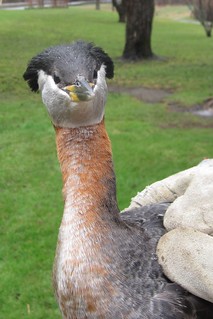Monday, April 9, 2012
Crash Landing of a Grebe
When the phone rings at North Branch Nature Center, we never know quite what we'll hear when we pick up. Today, we were surprised when a caller told us about a duck that was stuck in a puddle on the sidewalk in downtown Montpelier! The bird turned out to be a Red-necked Grebe.
Grebes are similar in appearance to ducks, but come from a very different lineage. Like loons, grebes eat fish by diving underwater. They've evolved nicely to this lifestyle, with their legs attached towards the back of their bodies (like the motor on the back of a boat). They have lobed toes, which allow their feet to act as flippers and propel them through the water. As a consequence of their anatomy which is so well adapted to life in the water, they are unable to take off from a solid surface.
Red-necked Grebes spend the winter along the Atlantic and Pacific coasts, and each spring they migrate at night to central and western Canada to breed. From above, a wet parking lot can look a lot like a big lake. Street lights can cause further confusion for birds, causing them to crash-land and become stranded on asphalt. In December, more than 4,000 Eared Grebes were grounded in a Wal-Mart parking lot in Utah, a quarter of which didn’t survive.
The Red-necked Grebe that crash-landed in Montpelier has an injured leg and was transported to a waterfowl rehabilitator this afternoon. If the leg does not heal, the grebe will be unable to hunt for fish and will not be rereleased into the wild. We hope this will not be the case, and that the bird will heal quickly so it can continue its northward migration. Traveling hundreds of miles each year is an inherently dangerous task for birds and other migratory animals and this incident demonstrates the added hazards that are created in a human-altered landscape.
Subscribe to:
Post Comments (Atom)



Thanks for being there to take care of this beautiful bird.
ReplyDeleteGreat shots, nice text - thanks!
ReplyDeleteBeautiful bird! Thanks for the photos.
ReplyDeleteGreat photos and story. Thanks for the rescue- hope it survives!
ReplyDelete